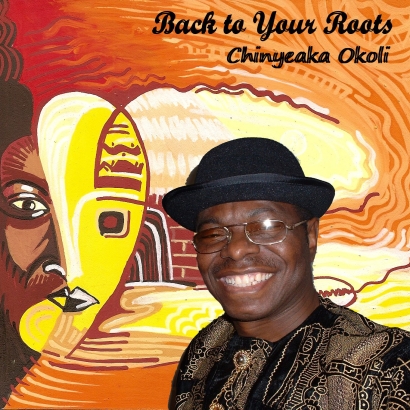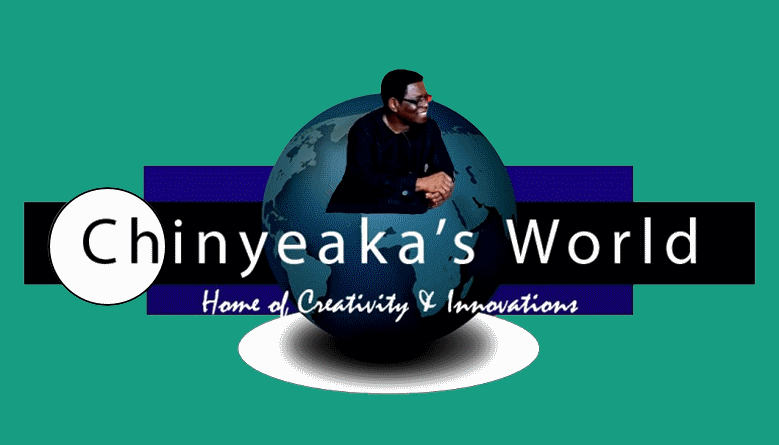
Egwu Okoso invites: “Fathers, mothers, Uncles, Aunts, Nephews and Nieces; brothers, sisters, in-laws, cousins, friends, and foes” to come and dance.
Ezinnem is a prayer to God to bless all mothers.
For The Sake Of Our Children calls for an end to divorce, if not for the couple’s sake, at least “For the sake of our children” who he says need to “see both parents living together” and doing things like “a family”. He evokes the image of the extended family: These children need their “father and mother, brothers and sisters, nephews and nieces, uncles and aunts.”
In Chinyeaka, he invites “man, woman, girls, boys, old and young” to come and dance. He prays God to bless everyone, even his enemies.
This song is one of my earliest written songs. It missed appearing in the first Album.
The Day That You’ll Say, “I Do” is another version of my earlier recorded wedding song re-recorded.
Egwu Okoso (Ay-goo Oh-koh-soh) – Okoso Dance
Okoso is the name given to the snail shell used for a kind of game in traditional African villages.
The snail-shell is cut and smoothened at the top, leaving a hollow shaped object that tapers from top to the tail. While holding the object one foot from the soil and swiftly flipped between the thumb and the middle finger, the hollow shell jumps off from the fingers and lands gracefully on to the floor as it continues doing a spiral and spinning “dance”. So beautiful is the look of this spinning shell that the Igbo ethnic people of Nigeria refer to a good dancer as “Okoso” (Yoruba ethnic group call it “Okoto”) a name fashioned after this spinning shell.
Chinyeaka said he wrote and developed Egwu Okoso music to demonstrate the relationship of most dance and music rhythms and to show the influence of African polyrhythms, particularly when it comes to lending our bodies to “the movements in time, space and with rhythm” called dance. All beautiful dance patterns/genres like Makossa, Merengue, Calypso, Soca, Kpanlogo, Soukous, Samba etc, come from the same root. Chinyeaka claims that any of the genres mentioned above will fit comfortably into this rhythm, Egwu Okoso.
In its beautiful lyrics rendition, the song welcomes everyone. It then invites all to come out and dance. Fully aware some people will not respond to the call with the excuse that they “cannot dance”, the songs says:
“If you know you cannot dance, you better come up to the floor and we will show you and teach you how to dance and move”
It leaves one with no other excuse but to get up and start dancing, or give in to be taught how to ‘dance and move’.
Ezinnem (Ayzeen’name) My Good Mother
A powerful African funk rhythm that brings out and celebrates the uniqueness of motherhood. It remembers and sings in praise of all the things that mother did for her child from conception till adult hood- she gave the child blood in the womb, her breast milk at birth, carried the child on her back like a “horse”, comforted and dried its tears when the child cried, sang and lulled it to sleep when tired, took it to hospitals when sick, prayed to God for its life, cared for the grown man/woman and grandchildren of her child even after he/she is married…all these at no charge! The poet wonders,
“How can I reward you, mother, for your love and care! There’s nothing too big to pay for your kindness and love”
With the continued chorus of “Nnem Ezigbo nnem…” (Mother, my dear mother…) He offers prayers to God for a befitting reward to mothers:
“Please oh Lord, bless every mother. Give her everlasting peace, joy and happiness. Please protect all mothers, Make them happy. They are the greatest gift that you have given us, mankind”
The songs gets to a climax when the poet specifically remembers his own mother who is no more. Tearfully he prays for the soul of the departed:
“Bless my mother. I know she’s dead, but I know you’re taking care of her wherever she may be. Please protect her. Give her everlasting peace, joy and happiness until we meet, … meet on the last day Lord”
This is a traditional highlife rhythm – it is written in the writer’s own language “Igbo” (A language for over 70 million Igbo ethnic group of Nigeria). The song calls on all and sundry to come and dance. It tells us that the music is not for any category of people. It is for everybody-male/female, boy/girl, man/woman, young/old to join because the music and dancing is beautiful. At a point, the music makes a dramatic change breaking its singing to make room for real traditional percussions and dance movements. Very typical of our writer, he calls on God to bless everybody, including his enemies and to continue to bless and assist us.
Chinyeaka is the name of the writer as well as the song’s title. By looking at the title, one would think that the writer is praising himself by using his name. When asked, he laughed and said: “I am not the proverbial lizard…I cannot and will not sing praises to myself. I sing my praises to God my maker. Chi is a short form of CHINEKE or CHIUKWU meaning ‘God of Creation or Great God’. Nyeaka means ‘help me/us or give a helping hand’ The final chorus “Olisa biko nyeluanyi aka” is the same message. Olisa is another name for God. Therefore the title means ‘May God give me/us a helping hand’ It is a prayer to God to bless and help us all”
A blend of Highlife, Merengue, Calypso rhythms rendered in Mixed pure English and Pigeon English. It sings about Marriage especially consequences of marriage and divorce. It tries to sensitize divorcees about their insensitivity of their actions and resultant consequences of divorce particularly on their children.
“When una talk say una go live, you no look before you leap? Ah, na wetin be dat? Na so una understand marriage…”
“Husbands and wives who are divorced, you must think again all for our Children’s sake. You must think again. These children need their role models. You must reunite. These children need to see peace. These children need to feel love. These children need all the peace and love and comfort and happiness of a family, father and mother yes, brothers and sisters, uncles and aunts, nephews and nieces please.”
It is a very touchy song, rich in its message content and flows with captivating rhythmic vibrations.
Dazie believes that a sound understanding and relationship with Our Maker as well as a deep knowledge of one’s cultural roots is among the highest achievements in life. Can a tree stand or grow without its roots?
A very remarkable and striking thing worth highlighting about most of Chinyeaka’s songs is the consistent echo of the theme of peace, love, unity, collectiveness, togetherness and the family. Egwu Okoso invites: “Fathers, mothers, Uncles, Aunts, Nephews and Nieces; brothers, sisters, in-laws, cousins, friends, and foes” to come and dance. Ezinnem is a prayer to God to bless all mothers. In Chinyeaka, he invites “man, woman, girls, boys, old and young” to come and dance. He prays God to bless everyone, even his enemies. For Our Children’s Sake calls for an end to divorce, if not for the couple’s sake, at least “For the sake of our children” who he says need to “see both parents living together” and doing things like “a family”. He evokes the image of the extended family: These children need their “father and mother, brothers and sisters, nephews and nieces, uncles and aunts”
Songs in this album will last generations upon generations, not just because of the polyrhythmic music rendition of the songs, or the captivating chants and choruses, but also for the richness of the lyrics, the creative and versatile blend of various music rhythmic genre and for the artist being himself. All the songs in the album have their own class and are universally educative, informative and touching.
